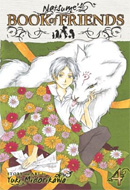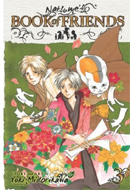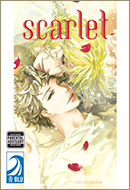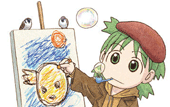Manga-ka: Yuki Midorikawa
Publisher: Viz Media
Rating: Teen (13+)
Release Date: October 2010
Synopsis: “Takashi’s quiet afternoon in the forest is disrupted when an angry spirit tries to possess him. He manages to dodge the spiritual attack, but he can’t as easily avoid the yokai’s pleas for help. Now he’s tracking down an escaped evil spirit that threatens the life of the forest. But he’s still learning that yokai never tell the whole truth, and the secrets spirits keep spell trouble for him!”
Yuki Midorikawa returns with yet another volume of Natsume’s Book of Friends, taking us back to the enchanting bittersweet realm of a boy haunted by Yokai due to his grandmother’s strange childhood hobby. Takashi’s grandmother Reiko Natsume made many enemies by enslaving yokai with her magical book of the work’s title, and this volume continues his encounters with the supernatural, and search for the comforts of a happy family life and friendships. With excellent art and characterization, Midorikawa creates a wonderful manga supported by VIZ’s strong production values.
The art shines yet again, as Midorikawa mixes sweetness with the ethereal and horrific. Her Yokai are a joy, a mixture of strangely cute cartoony creatures, mysterious masked melancholic maidens and horrific monstrosities. Highlights included teensy little masked yokai carrying their lord’s disembodied head, demonically possessed bunnies made of snow and a disturbing painting of a winter forest with a life of it’s own. The theme of masked yokai pops up again, yet Midorikawa strays from the theme a little with a more spirited female yokai who met Natsume as a young boy. The first human she met who could see her, she surprises little Natsume with her over enthusiastic attempts to frighten him. Her true nature is revealed as her mask slips slightly off to reveal a kind, smiling face, a wonderful little bit of artwork that establishes that chapters mood in a single moment.
Takashi’s attempts at making friends, both yokai and human, continues to be a core element of the work. Conflict arises as he debates how much he should trust his human friends. He often has more relaxed acquaintances with the predominately harmless, kind yokai he encounters, yet this volume offered a few who were just as manipulative as any human. One such yokai plays upon his compassion, setting herself up as a victim while reinforcing the guilt he feels for his grandmother’s past transgressions. His growth as he learns the dangers of this world progresses, while also contemplating being more open with other humans. Actor/Exorcist Natori returns, seemingly out to take advantage of his powers, yet simultaneously being open about things and extending a rare opportunity for friendship to Takashi. The dilemma of telling his adoptive family of his powers when other relatives rejected him because of the problems they cause is also a recurring element, one which will hopefully be resolved in future volumes. The kindly Mrs. Fujiwara makes one root for things working out, though the uncertain gray morality of Midorikawa’s realm casts a slight doubt on things.
Midorikawa’s authors notes continue to be a change in pace from most manga-ka. In place of cute anecdotes, she primarily talks about publication events. I was surprised to find out one of the early chapters in this volume was originally published as a booklet included as an extra in Lala, similar to a domestic comic book in presentation. This opening chapter is a delicate standalone tale about a lonely guardian spirit and an unleashed demon, whose connection reveals stunning commentary on the way humanity deals with the supernatural and unexplained. The relaxed, contained pace of most of the volume make it an excellent read, satisfying in it’s completeness, yet also creating a mood you hope to revisit in future volumes.
Other chapters were published as short stories, showing the sporadic nature under which some shojo manga are published. Reaching the fourth volume was a major milestone for Midorikawa, achieved through a varied output of the series which sounds to have been somewhat irregular at first, with random chances to get out extra bits. This is something that’s reflected in how often Takahashi recalls his past, each chapter able to act as an introduction to the series. It’s very similar to the approach of domestic comics in the past, wherein writers would sometimes treat every issue as if it were the readers first. Some may find this aspect repetitive, but Midorikawa handles it in way that’s mostly natural, reminding us of the grim responsibility the book represents for Takashi.
VIZ’s presentation continues to be exceptional, with a custom version of the “this book is backwards” inside back-flap using some of the volumes artwork to create a pleasant touch. VIZ added a short range of end-notes to help with some particular cultural elements of the book, using a crinkled paper background as a nod to the weathered look of the cover’s design. There’s excellent attention to detail in this book’s presentation, continuing the pleasant differentiation/customization of Shojo Beat titles VIZ has been doing with recent book. These elements are all appreciated, and compliment the quality of Midorikawa‘s work.
I’d easily recommend this series to all fans of quality manga, as it doesn’t entrench itself in superficial trends, instead focusing on creating a high degree of fantasy and sensitive character interaction. Those who love works like Mushishi, Aria and Two Flowers of the Dragon will appreciate the attention put into world building, as Midorikawa creates an otherworldly reflection of our everyday existence, lazing the days along with Nyanki-sensei, Takashi and the yokai they encounter.
Review written November 20, 2010 by Andre
Book provided by Viz Media for review purposes





 Follow
Follow



























[…] on vol. 1 of Maiden Rose (The Hooded Utilitarian) Deb Aoki on Mega Man Megamix (About.com) Andre on vol. 4 of Natsume’s Book of Friends (Kuriousity) Emily on Ookami Shounen (Emily’s Random Shoujo Manga Page) Oyceter on vols. 3-5 […]